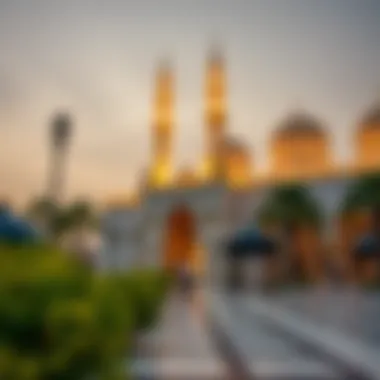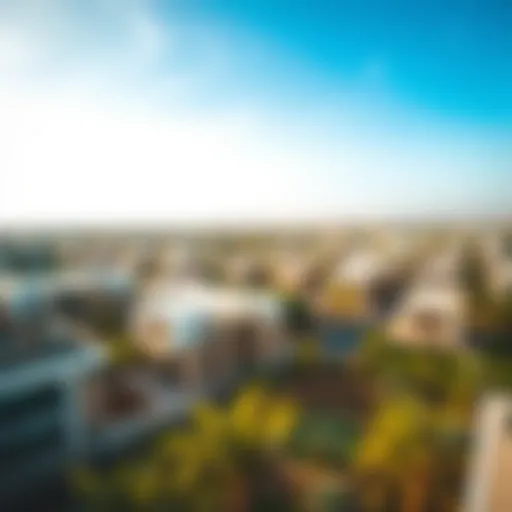The Start of Ramadan in the UAE: Insights for 2023


Intro
Ramadan is a significant cornerstone of the Islamic calendar, marking a period of reflection, fasting, and community bonding. As 2023 unfolds, the anticipation around the commencement of Ramadan in the United Arab Emirates (UAE) presents an opportunity to delve into its cultural importance and the broader implications for various sectors, particularly real estate.
In a melting pot of cultures such as the UAE, where diverse communities coexist, the arrival of Ramadan brings forth unique traditions and practices that resonate across different societal segments. It’s a time when businesses, families, and individuals witness shifts in activities and routines. Analysts, especially those in the real estate sector, keenly observe these changes, as they often hint at evolving market trends and opportunities.
Market Trends in Dubai Real Estate
Current Market Overview
The real estate landscape in Dubai has seen dynamic shifts leading up to Ramadan 2023. As the city recovers from the disruptions caused by global events, there is a noticeable uptick in demand for residential properties. Families are seeking homes that not only cater to their living needs but also support engagements and gatherings typical during this holy month. This transition reflects a broader sentiment towards stability and growth in the market.
Price Trends and Forecasts
In the build-up to Ramadan, a marked increase in property prices has emerged, particularly in areas that thrive during the month. Historically, properties close to mosques or community centers tend to see heightened interest. Investors are particularly keen on navigating these price trends, as they often signify lucrative opportunities. The forecast suggests a steady rise in prices across varied segments, driven by both local and expatriate interest.
"Investments in Dubai, especially during Ramadan, can be like striking gold for those who are attentive to the shifts in market sentiment."
Investment Opportunities
Hot Areas for Investment
Given the anticipated surge in demand, certain neighborhoods present themselves as particularly attractive for real estate investments:
- Dubai Marina: Continues to attract families seeking vibrant community living.
- Jumeirah Village Circle (JVC): Offers a mix of affordability and accessibility.
- Downtown Dubai: High-end properties maintain their appeal due to their proximity to major attractions.
These regions not only offer investment benefits but also witness an increase in rental demand, especially as families look for comfortable spaces to host Iftar gatherings.
Rental Yield Analysis
The rental market in the lead-up to Ramadan often sees a healthy uptick. With many expatriates choosing to stay in the UAE throughout the month, landlords can expect some increased yields. Areas like Al Barsha and Dubai Sports City have been known for good rental returns due to their strategic locations and amenities.
In summary, the commencement of Ramadan in 2023 serves as a pivotal moment for the real estate sector in the UAE. A deeper understanding of the socio-cultural dynamics at play not only enriches the experience of this holy month but also empowers investors and homebuyers to make informed decisions.
Understanding Ramadan
Ramadan is not merely a month in the Islamic calendar; it is a profound journey of spirituality, reflection, and community. Understanding Ramadan is crucial to appreciate its extensive implications in the UAE, particularly in 2023 when diverse cultures and traditions intertwine. This month stands as a powerful reminder of faith, discipline, and social responsibility. As residents of the UAE gear up for the holy month, those involved in the realms of investment, property buying, or real estate services should have a firm grasp of how Ramadan shapes community interaction and economic trends.
Historical Context
Origin of Ramadan
The roots of Ramadan trace back to the time of the Prophet Muhammad in the 7th century. According to Islamic tradition, it was during this month that the Quran was revealed. This historical backdrop contributes significantly to the month’s sanctity and practice among Muslims. The character of Ramadan is defined by fasting, charity, and prayer—a blend that enriches both individual and collective religious experiences. Understanding the origin of Ramadan helps highlight the essence of this holy month and why it resonates deeply within Muslim communities. In terms of its utility in this article, bringing forth its historical elements provides readers with a contextual framework, transforming mere comprehension into appreciation.
Significance in Islamic Tradition
The significance of Ramadan in Islam transcends fasting. It symbolizes a comprehensive approach to self-improvement, empathy for the less fortunate, and deepening one's connection with God. The practice of fasting develops a sense of urgency regarding charity, reflection, and piety. This feature is particularly beneficial for our audience, as understanding these facets can translate into more profound community engagement and philanthropic strategies within the real estate sphere. Moreover, grasping its spiritual significance can illuminate approaches to marketing that resonate emotionally with potential clients.
Astronomical Foundations
Lunar Calendar Explained
To grasp the timing and practices associated with Ramadan, one must understand the lunar calendar. Unlike the Gregorian calendar, which is solar, the Islamic calendar is based on the moon's cycles. Each month lasts either 29 or 30 days, leading to variability in the timing of Ramadan each year. This structure not only emphasizes the connection between celestial phenomena and historical traditions but also allows for a more profound appreciation of seasonal changes. Knowing about this lunar calendar is particularly advantageous, as investors and businesses can plan events and promotions more strategically when aligned with the religious timeline.
The Role of Moon Sighting
The actual commencement of Ramadan hinges significantly on moon sighting, which can vary by location and tradition. This practice involves the physical sighting of the crescent moon to officially mark the beginning of the month. The implications of this method create a unique feature that not only highlights local traditions but also emphasizes a sense of community. For those involved in real estate, the unpredictability tied to moon sightings can affect market movements, cultural events, and property sales during this period, making it essential knowledge for successful engagement in the UAE's dynamic environment.
"Ramadan is a time to reflect, spiritually recharge, and reconnect with community values. Understanding its foundations can set the stage for effective businesses strategies during this holy period."
Ramadan Timing in
Understanding the timing of Ramadan is critical, as it sets the rhythm for various aspects of life in the UAE during this significant month. The month of fasting is steeped in cultural, spiritual, and practical implications. For investors, homebuyers, and real estate agents, understanding the timing intricacies can have a direct impact on planning and decision-making strategies.
Expected Start Date and Variability


Traditional Calendar Dates
The traditional Islamic calendar relies on a lunar system; hence, Ramadan typically begins on the ninth month of this calendar. The predicted date for the commencement of Ramadan in 2023 is around March 23. This estimate holds significant importance for several reasons. First, traditional calendar dates provide a framework for believers to prepare mentally and physically for fasting during this holy period. Moreover, this conventional approach helps families and communities align their schedules, ensuring that everyone is on the same page regarding the start of Ramadan.
However, it’s crucial to recognize that these dates can vary, prompting discussion within households on specific preparations and events. Given the spiritual weight of the month, a minor shift in dates can evoke varied emotional and practical responses within communities, especially among those who prioritize religious observance. The challenges of differing start dates add complexity in the planning of local events and retail promotions tied to the month.
Impact of Moon Sighting on Start Date
The actual start of Ramadan is primarily dependent on the sighting of the new moon. This impacts the start date, as each year it tends to shift by about 10 or 11 days earlier when compared to the Gregorian calendar. This reliance on lunar sightings adds a unique character to Ramadan.
Consequently, communities may have different dates, contingent upon their local moon sighting practices. Such a distinctive practice can lead to moments of collective anticipation, as believers hope to catch the first glimpse of the crescent moon to signal the month’s onset. In the UAE, this practice reinforces community ties, sparking discussions among families and friends regarding the importance of collective participation in Ramadan.
Regional Considerations within the UAE
Affect of Local Customs on Timing
Cultural practices can influence the way Ramadan is observed throughout different regions in the UAE. Local customs may offer unique methods of marking the beginning of the month, including prayer schedules, community events, and breaking fast rituals. The effect of these customs plays a crucial role in shaping community dynamics during Ramadan.
For instance, some emirates may have designated nights where they host public Iftar events, fostering unity among residents. Meanwhile, others might celebrate with more intimate family gatherings. These local customs add a layer of richness to the observance of Ramadan, offering a diverse range of experiences that honors both tradition and community.
Variability Across Emirates
In the UAE, variability across emirates presents an additional layer of complexity concerning the timing of Ramadan. While the general framework exists, individual emirates may implement distinct practices based on local leaders and religious authorities.
This variance can create a mosaic of celebrations and observance styles—Dubai may hold larger public events than smaller emirates, for example. Investors and real estate professionals should be aware of these regional differences, as they could influence market trends in various areas. Properties near community gathering spots might see increased interest during this period, while different scheduling could shape local service industries accordingly.
Cultural Impacts of Ramadan in the UAE
The commencement of Ramadan holds a central place not only in the hearts of Muslims but also within the rich tapestry of Emirati culture. In this context, the cultural impacts of Ramadan in the UAE extend beyond the act of fasting; they weave together societal norms, deep-rooted customs, and economic adjustments that reflect the significance of this holy month on community life. For many residents, Ramadan is a period of reflection, spirituality, and connection with others, making it an essential aspect of both their individual lives and the broader social framework.
Societal Practices during Ramadan
Fasting and Reflection
Fasting during Ramadan is more than just abstaining from food and drink; it encapsulates a profound practice of self-discipline and spiritual growth. This aspect of fasting substantially contributes to personal and communal wellness. Fasting allows individuals to practice patience and empathy, drawing them closer to those who are less fortunate. The feeling of hunger serves as a reminder to be grateful for daily blessings.
Additionally, fasting promotes reflection, leading many to evaluate their life choices and connections with others. This inner contemplation empowers individuals, enhancing their sense of community around shared experiences.
However, fasting can also pose challenges, particularly concerning energy levels and focus. It’s essential for those observing to find a balance between work responsibilities and personal commitments. In this way, fasting becomes a double-edged sword, having the potential to foster deep spiritual connections while also creating practical hurdles.
Community and Family Events
Community and family events during Ramadan create an inclusive atmosphere where relationships are nurtured and strengthened. These gatherings often center around Iftar, the meal to break the fast, where friends and families come together, sharing food, stories, and laughter. The communal spirit of the holy month can be found in local mosques hosting nightly prayers, known as Taraweeh. This distinctive feature of Ramadan highlights its role in bolstering social ties within the community.
Events like charity drives and social feasts also play a significant role. They emphasize unity and reinforce the importance of giving back, encouraging residents, be they Emirati or expatriate, to participate. Still, such gatherings may bring along challenges of coordination and planning, especially in a diverse city like Dubai, where various cultures intersect. Many families lean on their customs, navigating personal and cultural expectations while ensuring inclusivity.
Impact on Daily Life
Daily routines see notable shifts during Ramadan, affecting the nature of life in the UAE. These changes are not merely about adjusting schedules but involve a broader recalibration of lifestyle and habits as communities adapt to the rhythm of the holy month.
Changes to Work and School Schedules
Changes in work and school schedules during Ramadan are integral to accommodating the needs of those observing the fast. Many organizations implement flexible hours or reduced working times, allowing employees to rest adequately and partake in religious duties without compromising productivity. This positive adjustment in work-life balance may lead to increased job satisfaction and loyalty among workers.
However, it might also introduce disruptions. For instance, students face compressed academic timelines, resulting in challenges for curriculum delivery. Thus, while the shift aims to promote balance, there are trade-offs to consider, particularly for those juggling multiple commitments.
Shopping and Dining Adjustments
Shopping habits also undergo a substantial transformation during Ramadan. Consumer behavior trends shift towards increased spending, particularly on food products and gifts. Retailers adapt to this demand by extending their operating hours post-Iftar, accommodating the rush of late-night shoppers. The bustling markets and malls become vibrant hubs of activity after sunset.
Nevertheless, the scenario could lead to overcrowding and higher prices for certain items. On the dining front, many restaurants and cafes offer special Iftar menus, catering to the growing demand for festive dining experiences. While these adjustments enhance communal dining experiences, they may also provoke accessibility concerns for those wishing to find suitable places to eat.
The cultural impacts of Ramadan in the UAE are both profound and multifaceted, influencing the very fabric of everyday life. From societal practices, such as fasting and community gatherings, to significant changes in daily routines, Ramadan shapes a unique environment that resonates deeply with the values of the Emirati community.
Economic Aspects of Ramadan
Ramadan is not just a spiritual season; it has a significant economic impact, particularly in the UAE where the blend of tradition and modernity flourishes. The holy month brings shifts in consumer dynamics and influences various sectors, making it a crucial study for investors and market analysts alike. It's essential to recognize how the behaviors and patterns during this period can affect economic opportunity, especially in retail and real estate.
Effects on the Retail Sector
Consumer Behavior Trends


During Ramadan, consumer behavior tends to shift markedly. Many people engage in extensive shopping, driven primarily by the need to prepare for Iftar meals and the exchange of gifts. This season sees a surge in purchases for traditional foods, decorations, and even clothing.
One notable characteristic of this trend is the increase in bulk buying. Consumers often buy in larger quantities to accommodate family gatherings and celebrations. This approach benefits not just retailers, as it increases sales volume, but also consumers, who can find certain promotions appealing when they shop in bulk. On the flip side, impulse buying can sometimes lead to excess spending, straying from budgetary constraints.
The unique aspect of how these trends manifest during Ramadan lies in the heightened awareness of community and family. This collective spirit encourages spending on items that foster togetherness. While this is largely beneficial for the economy, retailers must navigate the fine line between catering to festive spending and promoting responsible consumption.
Promotional Activities during Ramadan
While consumers change their spending habits, retailers also adjust their marketing tactics during Ramadan. The special offers, discounts, and promotional events become more commonplace, targeting consumers more effectively. These activities often reflect the cultural significance of the month, emphasizing generosity and community involvement.
These promotions not only draw in foot traffic; they create a festive atmosphere that encourages social shopping experiences. Highlighting charity and giving back is often tied into these events, which resonates deeply with the values of Ramadan. However, because many promotions can lead to overcrowding in stores and potential disappointment for consumers if stocks run out, retailers must consider effective planning and inventory management.
Ramadan's Influence on Real Estate
Investment Patterns during Ramadan
The real estate sector is remarkably receptive during Ramadan, witnessing noticeable patterns in consumer interest and investment. It's not unusual for new developments to be unveiled around this time, as many investors believe that the holy month offers a unique opportunity to attract buyers. The hospitality sector, in particular, tends to see a rise in demand due to travelers seeking spiritual experiences.
Moreover, there is often a spike in inquiries from potential buyers looking for homes that can accommodate extended family gatherings during Ramadan. This interest can increase property values temporarily but needs to be managed with foresight to avoid post-Ramadan dips. Investors should note that a well-timed buying strategy might reap benefits if properly aligned with the demands of the season.
Market Fluctuations Associated with the Holy Month
Market fluctuations in Ramadan reflect the heightened economic activity. Rental prices and lease agreements can vary significantly during this period, often increasing due to the transient nature of the demand, especially in areas with high tourist footfall or cultural events.
The key to navigating these market fluctuations lies in understanding consumer preferences and behavior shifts, taking advantage of the festive mood. For investors and home buyers, identifying well-placed properties can lead to favorable returns and investment success. However, one must also be cautious about potential vulnerability to market corrections that may follow a spike in demand post-Ramadan.
"The economic landscape during Ramadan is like a double-edged sword; it offers opportunities but also demands careful navigation."
Enhancing Community Engagement
Community engagement during Ramadan serves as a bridge, strengthening the ties between individuals and various organizations within the UAE. The holy month prompts a collective sense of responsibility, where everyone feels the pull to contribute to the social fabric. This section explores how charitable initiatives and interfaith understanding foster a deeper connection among diverse communities living in the UAE, reflecting values of compassion and unity.
Charitable Initiatives
Importance of Giving Back
Giving back has a pivotal role during Ramadan, transcending mere financial contributions. It signifies a commitment to support the less fortunate, effectively weaving altruism into the cultural tapestry of the UAE. Community members frequently participate in food drives, clothing donations, and even sponsor Iftar meals for those in need. This acts not just as an act of charity, but as a way to promote empathy.
The key characteristic of giving back is that it resonates with countless individuals who see it as more than a duty; it's an opportunity to enrich their own lives through service. Many people find inner peace and fulfillment in helping others, transforming personal wealth into community strength. Although it incurs the costs of resources, the emotional rewards and social cohesion often outweigh these concerns. In a place like the UAE, where diverse cultures intersect, acts of kindness foster harmony and respect among communities.
Local and International Charity Drives
Local and international charity drives during Ramadan highlight a shared vision of empathy and camaraderie. Volunteering in these initiatives allows participants to understand global issues while taking action locally. Examples range from supporting food banks within the UAE, like the Emirates Red Crescent, to propelling international efforts via organizations such as Oxfam. This demonstrates how local needs can be addressed while connecting to broader humanitarian causes.
The most compelling feature of these drives is their adaptability. They can cater to immediate local needs or address larger global crises, making them versatile and impactful. While the advantage is obvious, fostering greater awareness among communities, potential challenges include the need for stringent organization and reliable partnerships to ensure that collected resources reach intended recipients. Nevertheless, it's a vibrant aspect that reflects the spirit of Ramadan.
Interfaith Understanding
Promoting Cultural Exchange
Promoting cultural exchange during Ramadan serves as a meaningful opportunity to break down stereotypes and foster mutual respect. Events like interfaith Iftar gatherings create spaces where individuals from various backgrounds come together to share meals and experiences. This act has the unique quality of nurturing genuine relationships, prompting individuals to learn about one another's traditions and foster a sense of community.
The beauty of cultural exchange lies in its ability to enrich all those involved. Through shared experiences, participants discover common values and goals. In a melting pot like the UAE, such initiatives offer a beneficial avenue for establishing connections that might otherwise not occur. While organizing these events can be logistically challenging, the sense of unity and understanding that emerges often outweighs any hurdles faced in the planning process.
Educational Programs about Ramadan
Educational programs focused on Ramadan play a significant part in informing individuals about its customs and significance. Schools and community centers often take the initiative to offer workshops or seminars that allow both Muslim and non-Muslim community members to engage in discussions about the month’s rich traditions and practices. This serves not only an educational purpose but enhances community engagement by encouraging dialogue.
One distinctive feature of educational programs is their adaptability to different audiences' needs. Whether aimed at children, adults, or even the elderly, tailoring sessions enables participants to receive information in a more digestible manner. The challenge lies in making these programs accessible and engaging enough to garner wider participation. Despite this difficulty, the long-term benefits of fostering understanding far outweigh the upfront investment of time and resources, solidifying the community's bonds.
"Community engagement during Ramadan isn’t just about spirituality; it's an avenue for connection, understanding, and progress in a diverse society."
Planning for Ramadan in the UAE
Preparing for Ramadan in the UAE is a blend of cultural respect and practical considerations. As this holy month approaches, understanding the intricacies of logistics and investment opportunity shapes the experience for both residents and newcomers. Knowing how to effectively plan can make a significant difference in managing daily life and investment strategies during this period.


Logistical Considerations
Travel and Accommodation
Travel and accommodation during Ramadan come with certain nuances. As people tend to gather with family and friends, hotels and rental properties can see a rise in occupancy rates. Many establishments offer special packages aimed at those looking to celebrate the month in a meaningful way.
A key characteristic of travel during Ramadan is the heightened interest in cultural experiences. Visitors are not only looking for a place to stay but also for a chance to immerse themselves in local traditions. Hotels may feature Iftar meals and pre-dawn Suhoor options, making them a popular choice for travelers. However, some may find that availability can get tight as the month progresses, especially in well-known areas like Dubai and Abu Dhabi.
While there are many benefits to booking early, one must be cautious of potential price hikes. As demand increases, it can put a strain on travelers’ budgets. It's advisable to weigh options carefully and explore various accommodation types, from luxury hotels to private rentals.
Day-to-Day Living Arrangements
The rhythm of day-to-day living changes significantly during Ramadan. Adjustments in work hours and school schedules are commonplace, allowing for time to fast and pray. Residents often rearrange their daily routines, moving social activities to evenings.
A hallmark of day-to-day living in the UAE during Ramadan is the communal aspect of the meals. Many homes fill with laughter and conversation as families gather for Iftar. This not only enriches personal bonds but also strengthens community ties. However, adapting to the new routine may be challenging for some, particularly for expatriates unfamiliar with fasting traditions.
As an added consideration, one should think about how to manage work responsibilities and general errands without disrupting communal practices. Balancing work expectations while respecting the fasting schedule can be tricky, but with clear communication, it is achievable.
Investment Opportunities
Real Estate Developments during Ramadan
Ramadan also serves as a unique time for real estate developments in the UAE. There’s often a surge in interest from investors aiming to capitalize on the changing market dynamics during this period. Developers might launch new projects or promote existing ones as buyer interest peaks post-Iftar, when people feel more inclined to discuss properties in a relaxed setting.
A distinguishing feature of real estate developments during Ramadan is how promotional efforts often align with the spirit of giving prevalent during the month. Discounts or incentives may be offered by developers, making it an attractive time for potential homebuyers and investors. However, one must keep an eye on long-term implications instead of making decisions solely based on temporary offers.
Investing during this time requires careful consideration as market patterns can fluctuate rapidly. While new opportunities might arise, understanding the shifts in demand and price sensitivity during Ramadan can be beneficial.
Targeted Strategies for Investment
Entering the property market during Ramadan can be ripe with possibility for savvy investors. There are targeted strategies that can help make the most of opportunities available. For instance, focusing on family-oriented developments or areas with high footfall during Ramadan can prove lucrative.
A critical characteristic of these investment strategies is their adaptability. Investors who keep their finger on the pulse of market shifts tend to fare better. Offering properties equipped for Ramadan—such as those with communal spaces for Iftar—can appeal to both buyers and renters seeking a meaningful observance of traditions.
However, investing during this holy month can come with risks as well. Market volatility can mislead decision-making, so proper due diligence is essential. Understanding the local real estate trends and how they react to seasonal changes in consumer behavior is key.
Effective planning not only enriches personal observance but also opens doors in terms of community engagement and investment prospects.
Concluding Thoughts on Ramadan's Role in the UAE
Ramadan serves as a pivotal moment in the UAE, shaping both individual lives and the broader social fabric of the nation. As the holy month approaches, it fosters a sense of unity and belonging among the Muslim population, creating a unique atmosphere that resonates with gratitude, reflection, and community. Understanding Ramadan's importance goes beyond religious observance; it deeply influences cultural, economic, and social dynamics in the UAE.
Through the lens of cultural significance, Ramadan embodies more than fasting; it signifies a time of introspection and charity, encouraging individuals to prioritize their spiritual growth and act with generosity. This influx of goodwill permeates communities, fostering bonds that might otherwise remain unremarkable. Furthermore, institutions turn their eyes towards charitable contributions and social programs, highlighting the critical role that these actions play during this sacred month.
The economic dimensions of Ramadan present another layer of relevance. Retail businesses prepare for an upswing in consumer activity, tailoring their marketing strategies and product offerings to meet the needs of a diverse clientele. From special food items to discounted services, the month becomes a dynamic period for commerce. Recognizing these shifts is essential for investors and business owners looking to capitalize on Ramadan-related trends.
Reflecting on the Past and Future
Lessons from Previous Years
Ramadan in previous years has taught valuable lessons about adaptability and community resilience. Each year, unique challenges arise; one could consider how the global pandemic altered traditions, emphasizing health while also unveiling the innovative spirit of gatherings via virtual platforms. This adaptability showcases the community's ability to embrace change without losing sight of essential values.
The key characteristic of lessons learned is that they illustrate the importance of flexibility. By reflecting on how past years navigated obstacles, the community can harness these insights to tailor their observance in the years to come. The unique feature of this dynamic is the blend of tradition with modernity, making Ramadan not just a historical observance but also an evolving social construct that can resonate with younger generations.
Looking Ahead to Future Ramadans
When one thinks about future Ramadans, it's significant to explore how technological advancements could reshape the experience. For instance, mobile applications designed to help with prayer times, iftar notifications, and charitable opportunities could become commonplace. This potential advancement highlights a possible shift towards enhanced engagement among the younger population who are digital natives.
Moreover, the unique aspect of future observances might include even more inclusivity, as diverse communities within the UAE become more engaged in cultural exchanges around Ramadan. This engagement can lead to an enriched understanding of the holy month, fostering respect and appreciation across different faiths and cultures. While opportunities abound, potential challenges such as commercialism during Ramadan could dilute its core values, making it essential to strike a balance in preserving sanctity while embracing modernization.
Final Recommendations for Residents and Investors
Balanced Approach to Observing Ramadan
A balanced approach to observing Ramadan focuses on achieving harmony between spiritual fulfilment and everyday life. For residents, this means maintaining productivity in the workplace while also setting aside time for personal reflection and family unity. It's essential to consider the varying lifestyles and perspectives that individuals bring to this time—some may embrace traditional fasting and prayer, while others may adjust these practices to fit their circumstances.
The key characteristic of this balance is thoughtful integration. Striking a chord with both the spirit of Ramadan and the demands of daily life ensures that the holy month remains a period of meaningful engagement, avoiding the pitfalls of burnout. This approach's unique feature lies in its call for individual customization, allowing people to carve their path through the month while maintaining respect for its traditions.
Strategic Engagement in the Property Market
As Ramadan approaches, the property market can experience fluctuations, making it a critical time for strategic engagement. Investors should be aware of the seasonal trends that impact housing demand, particularly as families prepare for the communal gatherings that often characterize iftar meals. Understanding local customs and preferences is crucial for effectively navigating this dynamic landscape.
The key aspect of this strategic engagement is market timing and community responsiveness. Investors who embrace a nuanced understanding of the fluctuations in demand can optimize their investment strategies, tapping into opportunities that arise during this period. The unique feature here involves aligning investment initiatives with community needs, thereby fostering a symbiotic relationship that could yield long-term benefits well beyond Ramadan itself.















